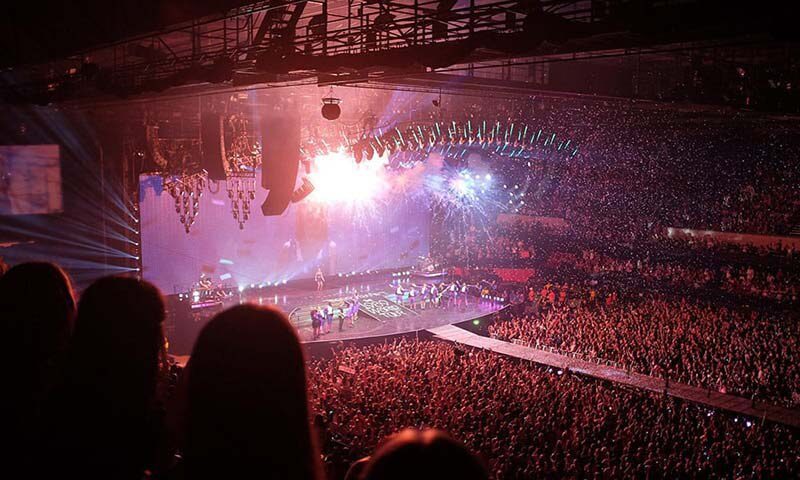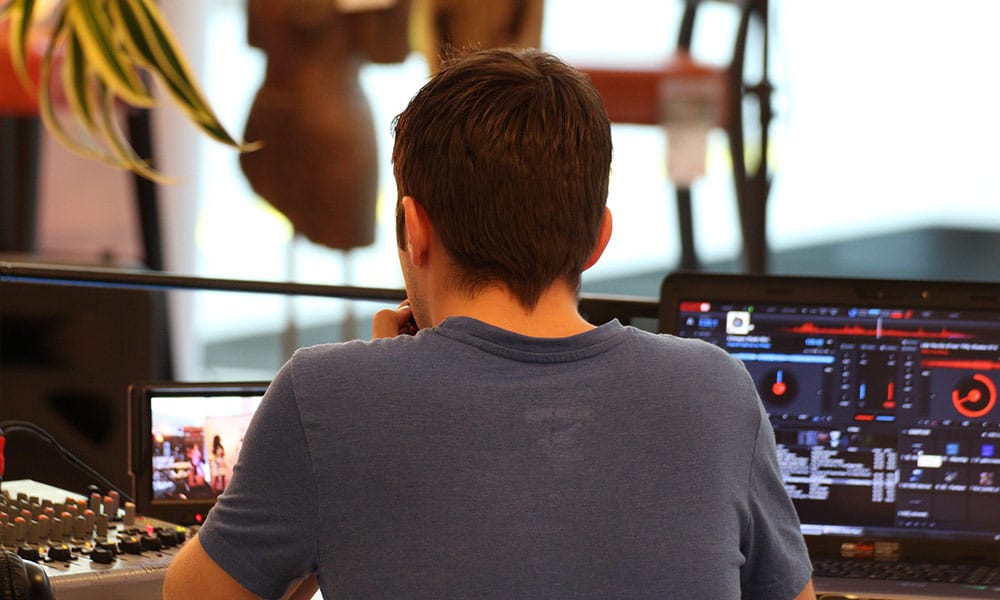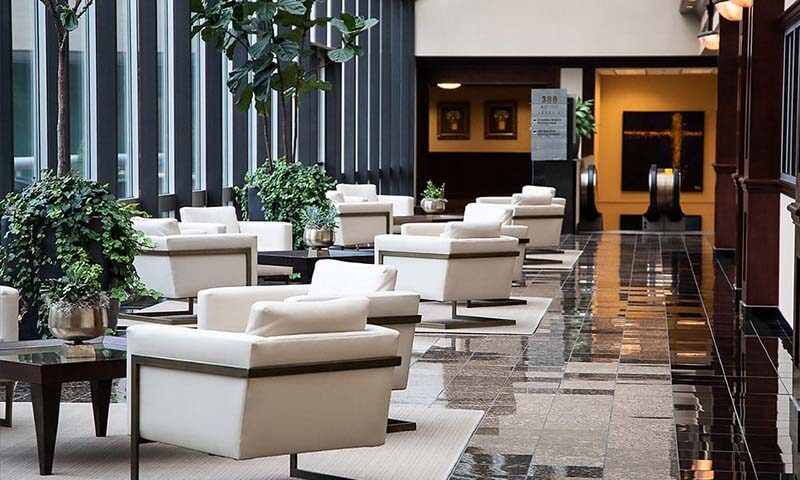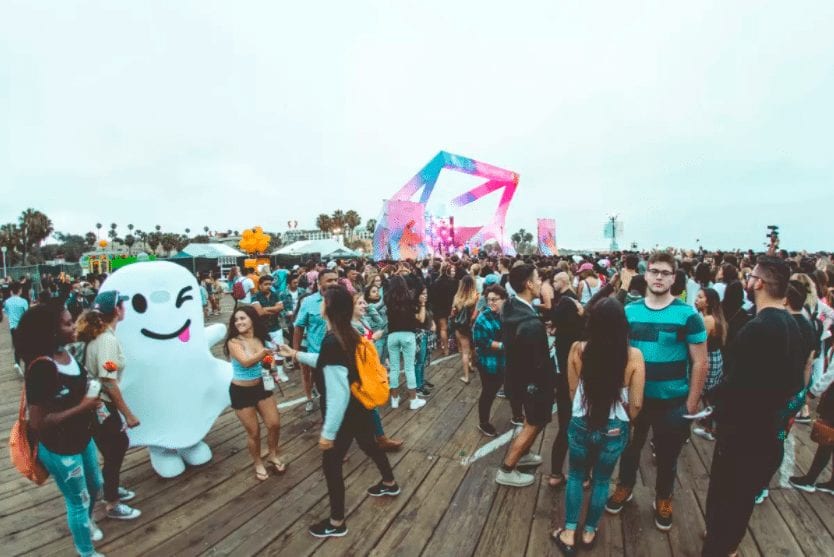Are you already planning this year’s meetings and events? With the meeting and event industry always changing, it’s important to stay up-to-date on the latest trends and attendee expectations to ensure your event’s success. To help you bring this year into focus, we’ve researched and outlined this year’s top 20 event industry trends. Get the 20/20 vision you need to make the best out of your 2020 event strategy.
We organized this year’s top 20 event trends into three categories for you:
- Event Industry Trends
- Event Technology Trends
- Event Venue Trends
Let’s dive into it!
Event Industry Trends

1. Event Organizers Will See an Increased Demand for Events
Latest research projected the demand for meetings and events in 2020 grow by 5-10 percent. Sounds great on the face of it, but there’s always a “but”…: Because of this projected growth, hotels will be charging between 2.41 percent and 3.7 percent more for group rates.
What does this mean for event planners? You should plan to book your venues early, and you might need to adjust your venue budgets to anticipate these higher hotel and venue rates.
2. We’ll Witness a Boost in Event Security
Because of the increase event demand projected for 2020, security is on the minds of many planners, making increased event security a big trend for this year. In fact, as many as 47 percent of planners report crisis communications as one of their biggest focus when planning for security in 2020. Conversely, only 53 percent of planners actually have an emergency plan.
So, how do you create a crisis communication plan? MPI offers a great crisis communication course. It teaches you how to create a proper plan and prepare for crises at your event. Taking a course like this may be on many a planner’s agenda – who doesn’t want to increase their event’s overall security and keep their attendees, staff, and themselves safe?
3. You’ll Plan More Events in Virtual Reality
Virtual event planning, specifically virtual site visits, is shaping up to be another big projected 2020 trend in the industry. It seems like a no-brainer, since it saves planners a lot of time and money by eliminating in-person venue site visits.
Some are still skeptical – can you really get a feel for a venue without seeing it in person? While it will still take a while for VR to become widely used in the industry, currently it can help speed up the venue selection process, while helping the early adopters stand out. Each venue typically has information like their floorplans, capacity, seating setups, photos, videos, and food and beverage packages on their websites. When this information is used in conjunction with VR , planners get a much better picture of the venue. Not doesthis save planners time and money, also helps them diminish their event’s carbon footprint by minimizing travel.
4. Sustainability Will Plant Itself Center Stage
We all know sustainability has been a growing concern over the past decade. . Hosting sustainable events will remain a big trend for planners and venues in 2020 as well. In 2020, you may see sustainability become the expectation of how an event should be run. Small sustainability nods like recycling tactics may no longer be enough, and planners may need to incorporate sustainability more holistically throughout the event’s lifecycle.
To help you start planning for this, we’ve curated a list of the top six ways to incorporate sustainability into your 2020 events:
- Educate attendees on sustainability
- Offer plant-based catering
- Use recycled materials for event design
- Ban single-use plastics
- Go paperless with cashless payment technology
- Sustainable swag (e.g. metal straws; reusable coffee cups)
Bringing sustainability into your event is an opportunity for planners to not only help the environment and reduce their event’s carbon footprint, but also to portray their brands in a positive light.
5. Wellness Will Grow In Importance for Both Organizers and Attendees
Wellness in the meeting and event industry boomed in 2019, and 2020 will be no different. Why? Maybe because happier attendees tend to be more engaged, or because event planning has been consistently ranked as one of the most stressful jobs in the world.
In 2019, planners incorporated wellness into their events by offering yoga and meditation sessions and screen-free zones, to help their attendees increase their physical, emotional, and mental wellness.
In 2020, planners and attendees can expect to see more guided meditation sessions, massages, screen-free zones, yoga, healthier food and beverage choices, locally sourced cuisine, more alcohol-free events, outdoor sessions, fitness breaks, lunch and learns on mental health, and venues offering established wellness programs.
Not only is the wellness trend a great opportunity for venues to capitalize on wellness offerings, but this trend will have everyone involved (event planners included) feeling happy and healthy.
6. Marketing Departments Will Invest More In Events
2020 will be the year that we see an increase in companies investing in events as a marketing channel. Why? Because in 2019, 52 percent of event professionals said that event marketing drove more business value than other marketing channels. But what’s so special about an event that makes it an effective marketing channel? According to research, it’s all about networking and making face-to-face connections: something in-person events offer, unlike other digital marketing channels.
Knowing this, event planners can generate more opportunities for attendees to connect at their events. Want to encourage networking and attract more spend from marketing departments? Try the following: :
- Dedicate networking areas for attendees to connect.
- Use your mobile event app to matchmake like-minded attendees.
- Create digital badges that are easy to scan and hold your attendees’ contact information (e.g. name, title, company, phone number, email address).
7. Attendee Experiences Will Get More Personalized
This 2020 event trend comes from the attendees themselves: your guests demand more personalization. 96 percent of individuals reported that personalized events are now an expectation. Knowing this, planners need to ensure their 2020 events focus on personalizing every aspect of the attendee journey: from registration, to ticketing, to session recommendations.
But how do you as a planner give attendees this personalization? By compiling your event data. Your event data can help you identify specific topics an attendee is interested in and send personalized content suggestions before, after, or during your event. You can also utilize attendee event data to send personalized push notifications and session recommendations. These personal touches will help you ensure each attendee has a unique experience.
8. Consumer Festivals & Corporate Events Will Grow More Similar
This event industry trend mirrors a more general one – festivalization. According to reports, over 32 million people (14 million of which are millennials) attend over 800 U.S. annual music festivals. Knowing this, the event industry is following the trend as a whole. Many planners are adding music festivals to their corporate events. Your attendees can learn, network, and sign along with their favorite artists.
Although corporate event festivals will increase your attendee engagement, these events come with a complex host of logistical issues (e.g. venue capacity, spatial logistics, access control, etc.). To help planners outline all the moving parts for an event like this, we recommend taking advantage of your event management software tools and using an event diagramming tool.
9. Experiential Events Will Come Into Focus
Experiential has always been an added benefit of event technology, and its priority will continue to be a growing event trend in 2020. Why experiential events? Experiential events provide attendees with immersive, engaging, memorable experiences. It’s why 78.25 percent of event planners rated experiential events as the number one type of live event and entertainment.
How can event planners create experiential events? Here are 5 ideas to get you started::
- Instagrammable backdrops
- Engage attendee’s five senses
- Incorporate wellness activities
- Social media moments
- Leverage your event technology to personalize attendee’s event experiences
10. Event Planning Will Become More Data-Driven
Everyone knows that data is a powerful and useful tool, especially when it comes to understanding events. That’s why 74 percent of event professionals reported that data drives their decision making. In 2020, planners can expect to see data being further used to guide the event planning process.
What does this trend mean for planners? Planners need to ensure they have event management technology and software that effectively collects data from every stage of the event lifecycle.
Event Technology Trends

11. RFID Will Play a Big Role in Attendee Data
Although RFID technology and wearables have been trending for the past couple of years, this technology is projected to remain dominant in 2020. This is because improvements in RFID technology will allow event professionals to monitor and identify, in real-time, dips or spikes in different parts of your event, allowing you to make real-time changes to your event. For instance, if there is a dip in a particular session, planners can use this data and send attendees personalized push-notifications, encouraging them to join the session.
Not only does this RFID technology allow planners to measure which sessions, speakers, or activities were the most popular at their event, but RFID technology will also allow planers to measure attendee engagement during and after their event. With this data, event professionals and marketers can better understand their attendees, their interests, and adjust their event and marketing outreach accordingly. Advancements in RFID technology is probably one of the most exciting event tech trends for 2020.
12. Access Control Will Remain a Big Concern
Another top trend for events in 2020 is access control. Access control technology helps planners restrict and control attendee access into certain event areas (e.g. VIP areas) by encoding each person’s rights into a badge or a wearable before the event or during registration. Because security is a big industry trend this year, having access control technology at your event is a must.
Not only can access control technology be used to restrict certain people from certain areas for security reasons, but access control technology can also help control ticket reselling and copying, control event entry, and flag suspicious attendee behavior. In fact, Intellitix’s access control system stopped 7,028 unauthorized entries at one event.
Access control technology will help planners secure a smoother, safer, successful event.
13. Cashless Payment Wearables Will Dominate Badging
Cashless payment wearables (thanks Apple Pay) have been trending for a while now, in the event industry and more generally speaking. But for 2020, the event industry will see big improvements in cashless payments wearable technology. For instance, cashless payments can store attendees’ payment information on RFID event wearables, improving and simplifying the attendee experience. Attendees simply have to tap their wearable and they can digitally pay for drinks, food, and event swag, in addition to scanning in-and-out of event areas.
By using a cashless payment RFID wearable, attendees’ don’t have to bring cash, their credit cards, or physical tickets and vouchers. By incorporating this wearable technology into your next event, planners can increase attendees’ spend between 46 to 87 percent while going green by being a paperless event.
14. The Future of Event Tech Will be 5G
Whether you’re in the event industry, or not, you’ve probably heard about 5G as part of the wave of new event trends.
Although 5G won’t be commonplace until the end of 2020, this technology is already projected to have a huge impact on events. How? 5G is your 4G LTE (your current smartphone internet) but operates at 1,000-times the speed. This kind of speed would not only improve how fast your event app ran on your attendees’ phones, but it would also give event technology developers the opportunity to explore other internet event technology (e.g. 3D technology, augmented reality, virtual reality, etc.).
Simply put: planners will soon no longer have to worry about a venue’s WiFi.
15. Branded Event App Use Will Increase
As a meeting or event professional, you most likely use mobile event apps to engage attendees, streamline registration, and collect valuable attendee data. But is your mobile event app personalized to fit your brand? Your colors? Your logo? In 2020, the event industry will see a sharp increase in branded event apps and their use.
Event planners will also use these event apps more as attendee engagement tools than mere resource tools. Not sure how to engage attendees through your mobile event app and stay on top of the trend? We compiled a list of the four top ways:
- Implement gamification techniques (e.g. QR codes, scavenger hunts, social media contests) into your mobile app strategy.
- Poll or survey your attendees during before, during, and after your event.
- Send event attendees personalized push notifications and session recommendations.
- Use the attendee match-making and networking features to connect like-minded attendees at your event through your mobile event app.
16. Advanced Event Tech Will Become More Accessible
Technology has disrupted industries across the globe over the last decade, and while slower to move than others, the events industry has seen a similar trend. Although event apps saw explosive growth in 2010, many of the more advanced technology like NFC and RFID has often proved to be cost-prohibitive for all but the largest events and festivals.
But that’s all in the process of changing. As advanced tech becomes cheaper and more ubiquitous, innovation and development cycles also become shorter. This can also happen at an exponential rate. Festival technology may be experiencing further disruptions in 2020. New, all-in-one event platforms like CrowdBlink are entering the market, and delivering advanced tech while removing much of the associated overheads. As a result, event organizers should be on the lookout for tech that is capable of servicing their unique needs without breaking the event budget.
Event Venue Trends

17. Unique Venues Will Draw Event Organizers Away from Hotels
Where are you thinking of hosting your event this year? If you answered “hotel ballroom,”you might want to reconsider.
53% of planners reported that they are moving away from hotel venues in 2020, and 92 percent of planners said they are more likely to book a venue outside a hotel than they were five years ago. What are planners looking for instead? Unique venues! Hosting your meetings or events at a unique venue is part of an ongoing event trend because it helps create an engaging and memorable experience for your attendees. Here are the top 14 unique venue ideas for your next event in 2020:
- Museums
- Zoos
- Dinner Cruises
- Wineries and Breweries
- Ranches
- Parks
- Sport Fields
- Rooftop Bars
- Observation Decks
- Galleries
- Lofts
- Botanical Gardens
- Aquariums
- Farms
Although non-traditional venues are trendy and engaging, be sure to review our don’ts of non-traditional venue selection:
- Don’t forget about your event tech. Be sure to ask your unique venue about adaptors, projectors, and other tech needs.
- Don’t forget to ask your unique venue about customization options and packages. Customization and the ability to brand your venue space is very important for consistency and brand recognition.
- Don’t forget to be sure your unique venue can accommodate your numbers. Don’t choose a smaller venue for your event than you normally would.
18. Mid-sized Cities Will Gain More Traction over Large Cities
Although large metropolitan cities like New York City, Los Angeles, and Chicago have dominated the event location market for years, mid-sized cities are trending for 2020. Some of the most popular second-tier event cities for 2020 include Tampa, Portland, Charlotte, Denver, and Austin.
What’s the draw behind mid-sized event cities? How are they stealing the market away from large metropolitan cities?
- They’re more walkable. Many second-tier cities (e.g. Denver) are smaller and easier for attendees and planners to navigate. Attendees can walk around downtown and easily interact with all the city has to offer.
- They’re authentic and have unique cultures. The culture of second-tier cities (e.g. Austin) tends to be genuine, authentic, and unique – something that attendees can experience by dining or shopping in town and interacting with the locals.
- They’ll help you market your event. Another huge benefit of hosting your next meeting or event in a second-tier city is that planners can work directly with the convention and visitors bureaus (CVBs) to help you advertise and increase attendance at your event.
19. We Will Consume More Vegan & Plant-Based Food & Beverages
Going green at your events is trendy, and we are talking about more than recycling.
Gone are the days when planners could buy pizza or burgers to cater to their attendees’ dietary needs. As part of the growing event sustainability trend, we expect planners to offer a lot more vegan and plant-based food and beverage options to attendees this year. What does this mean for planners? They will need to work more than ever hand-in-hand with their venues and caterers to create tasty, innovative, green, plant-based dishes.
Although offering plant-based food options at events is definitely a growing trend, planners should still remember that 78 percent of people report meat as their main source of protein. So planners, take care of your plant-based crowd, but make sure you still offer some meat on your menus.
20. Minimalist Event Design
Less is more with this year’s event design trend – minimalism. From industrial open space venues, to white space on event tickets, to Food & Beverage presentation, many planners are looking to incorporate minimalism design into every step of their event’s lifecycle.
What does the minimalist trend really mean for your event? This design trend actually presents a huge opportunity for planners. With a minimalist design, planners need less decor, less furniture, smaller food portions, fewer seats, etc. Minimalism will help planners cut costs while still staying on-trend.
Conclusion
2020 is sure to be an exciting year in the meeting and event industry and these 20 event, technology, and venue trends are likely to be at the forefront of the industry. Each trend offers planners a unique opportunity to engage attendees and create better, more successful events.
Are you ready to incorporate these top 2020 trends into your next meeting or event?
Schedule a free demo with us, the leading global provider of technology for the world’s biggest events today.


